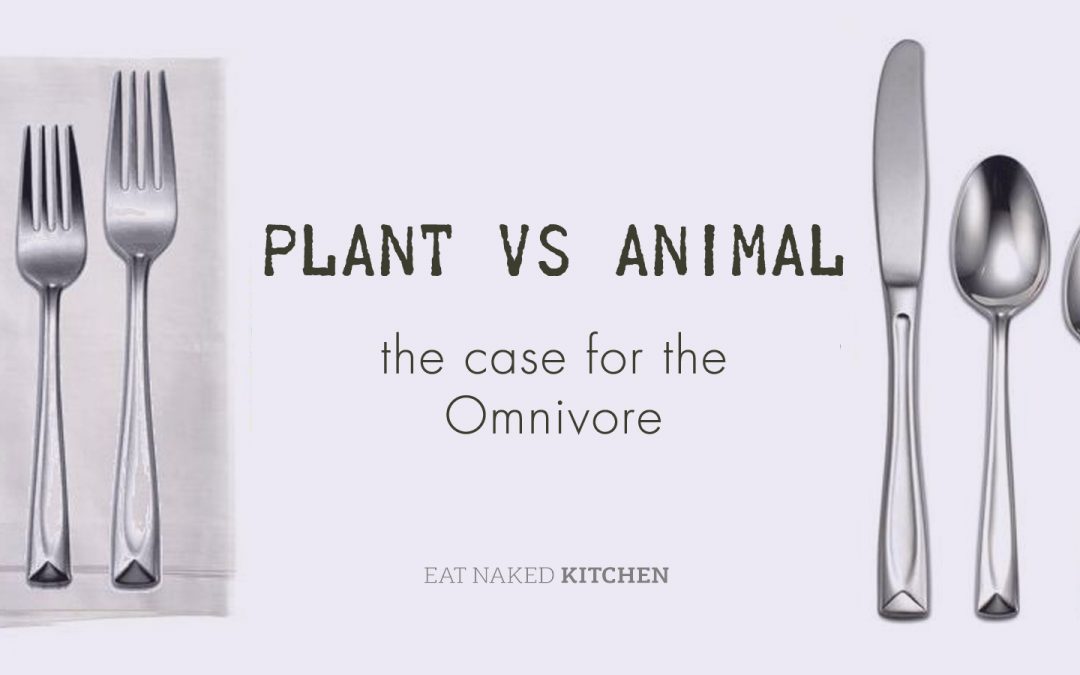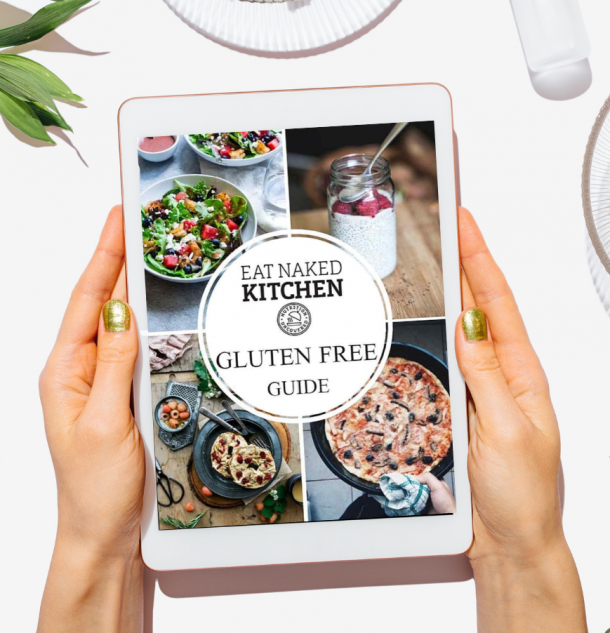
Written By Margaret Floyd, NTP HHC CHFS
Plant vs. animal.
I could also say: Vegan vs. Paleo or plant-based diet vs. traditional foods.
If you’re navigating the world of nutrition advice, you will certainly come across widely disparate views on what is the most nutritionally-dense, healing, and appropriate diet for us humans. It is confusing, to say the least.
At the heart of the matter are two primary schools of thought dressed in many colorful diet-specific variations:
School of thought #1: Plant foods are good, animal foods are bad. This is based on the belief that the nutrients (especially the fats) in animal foods are unhealthy and the root cause of most disease. Plant foods are largely lower in fat and provide an array of micronutrients you can’t find in animal foods, and are thus cleaner. Besides, it feels more virtuous to eat a salad than a steak.
School of thought #2: Plant foods are okay, but animal foods are awesome. This is based on the belief that our hunter-gatherer ancestors ate a diet rich in animal foods and thrived. The proteins and fats in animal foods are the most complete sources of some vitally important nutrients we simply can’t get from plants (branched-chain amino acids, most fat-soluble vitamins, plus many of the B vitamins), and are thus more nutritionally robust. Besides, that salad alone will leave you hungry.

So what’s the deal? Is one school of thought right? Both have testimony upon testimony of people who’ve changed their diet to one extreme or the other and experienced drastically beneficial health results. Both have scientific research (albeit imperfect and often flawed) backing them up. What gives?
A piece to this conversation that is rarely, if ever, discussed is the important role that these two types of foods have in the body.
At the most basic level, plant foods are deeply cleansing. With their fiber and high profile of micronutrients and anti-oxidants, they are excellent housekeepers. For the most part they have an alkalinizing effect on the blood that is an important balance to the often acidifying effect that many modern foods and an overconsumption of animal foods can create. After years of dietary abuse to our bodies, transitioning to a plant-based diet can feel incredible. It’s a powerful way to detoxify.
BUT: we can’t cleanse forever.
At a certain point, we need to build and repair. And that’s where animal foods come in.
Animal proteins and fats are structural and building. They provide the building blocks to many vitally important functions in our body – including hormone production, body repair, muscle development, brain development, and many more – in the most complete and bio-available form. At critical building times such as pre-conception, during pregnancy and breast-feeding, and for babies and children, these building blocks are absolutely essential. That a strictly plant-based diet requires supplementation to be complete is telling.
BUT: as much as we need to build, we also need to keep our house clean.
And that’s where plant foods come in.
My take? We are – and have always been – omnivores. Our teeth are designed to chew both plant and animal foods. Our digestive systems are designed to break down and assimilate both. Our bodies are designed to thrive on a balance of both. Pitting plant vs. animal as so many food debates do is like pitting the right side of your body against the left. Both are fundamental and vital to the whole. There is no “good” or “bad” – just different, and all important.
That said, there are two criteria that are absolutely vital regardless of whether we’re talking about a plant or an animal:
1) Quality trumps all. Pesticide-laden nutritionally-deficient industrial produce offers a mere shadow of the benefits (not to mention taste!) that seasonal, local, organic produce yields. Meat and dairy from industrial feedlots are a far cry from what you’ll get from pastured, healthy, and loved animals on all levels: nutritionally, environmentally, and energetically.
2) Form matters. Processing kills food, regardless of how it started. Take the most beautiful basket of organic fruit and vegetables, grown locally and picked when ripe – process and pasteurize this into commercial juice, and you’ve killed most of the value. Take some delicious pastured pork and mix it with excess sugar, “natural” spices (read: MSG and other chemicals), add a bunch of fillers and stabilizers, and you’ve got a nutritional nightmare on your hands.
The takeaway?
There are times to focus on cleansing, and times to focus on building and repair. Most of the time, however, we need to be doing a balance of both. Want to get and stay healthy? Eat a diet rich in high-quality, unprocessed plant and animal foods.
Plant plus animal = true health.
photo credit: Mike Licht




I am really pleased to hear your advocacy of an omnivore approach. However, the big divide for me seems to be whole grains, legumes etc versus protein and veggies ie many diets which include carbs versus the whole low carb diet school of thought.
What are your thoughts on that?
Many thanks!
Great blog post, Margaret. Really enjoyed it. Anytime I’ve veered too far to one side, my health has suffered. Vegetarianism did not work for me, though I know it can work well for others. I always find balance somewhere in the middle.
My husband just found out he has lung cancer and has had first dose of chemo. I am giving him as much fruit and veg( kale, spinach, carrots ect. )as he will eat. We are having meat just at dinner. I don’t know if he should eat more or not.
Loved this blog as I have just started Eat Naked in the New Year. I have constantly battled with different diets all my life and needed the perfect eating plan as I train hard and compete in triathalons. This is the best eating plan that I have ever come across. Being able to eat cheese and full fat dairy that I have always thought of as bad for you is just so amazing, I love my little adventures to find the quality meats and seasonal veggies, to learning how to cook foods to get the best flavour. I love the taste and I am loving learning all about real, unprocessed healthy foods and living. Thank you Margaret and James for your excellent advise and cookery books.
This is, hands-down, one of my favorite posts of yours, Margaret. It is a powerful, concise, and real discussion of such an important issue. I was left feeling like I really “get” the issue at hand and the importance of balancing our diet in this way – and most importantly, doing it in a mindful and conscious way by focusing on quality too. I know I always feel best when I’m eating this way! Thanks for writing this post – so awesome!
When you say that “natural” spices can mean MSG, do you mean that a food could have MSG in it and not say so in the ingredient list?
Abey – I sure do. Food labeling is so misleading sometimes. There’s a great new book coming out on this very topic. I’ll let you know when it’s out.
Kathryn – I agree, big discussions on grains/legumes vs. not. I think this is a very personal thing and depends largely on your body’s ability to process grains and legumes, along with how they’re prepared (properly soaked and/or fermented, or not). Some people do well on them, and others really don’t. It depends to some degree on your heritage.
Judy – I’m so sorry about your husband’s diagnosis. Definitely lots of those cleansing vegetables and fruits (I’d go heavier on the veg than the fruit to avoid accidentally getting in too much sugar) is going to be key. In terms of whether to include animal foods at this point or not – that’s a point of much debate. I’m not an expert on cancer, so I don’t want to make any specific recommendations, but there are certainly people out there who specialize in this very thing. I think your approach sounds very balanced and appropriate.
I am interested in your thoughts regarding studies showing a direct link between caesin and tumor growth, and the correlation between cancer and heart disease rates and meat eating populations. Surely these concerns should be considered as well in a discussion such as this.
You state that the fact that a plant based diet “requires” supplementation is telling, but don’t elaborate on what supplementation is required. Vitamin b12 is the only nutrient truly lacking from a well-rounded plant based diet, and this is only because our store bought food is washed and b12 comes from bacterium in soil. A vegan with a balanced diet who grew their own food and were discerning about washing be unlikely to require any supplementation.
I agree with the your general idea– everything in moderation–but I think some of your statements are misleading. I am also disappointed when articles like this don’t touch on the ethics of meat eating. It is a significant part of the discussion that can’t be swept under the rug because of its inconvenience.
@Madison – the studies showing a direct link between casein and tumor growth are flawed on many levels (one of the best resources for objective and thorough investigation of the science is here: http://rawfoodsos.com/), not least of which is that this is looking at a single protein, isolated from its whole food source, and extrapolating to all sources of animal protein. Any studies that have linked heart disease and cancer with meat eating populations have not taken quality into account – they are grouping factory-farmed, low quality, corn- and soy-fed animals with pastured, wild, healthy animals — and these are completely different in environmental impact, nutrition profile, and health impact.
To your point about B12 supplementation – the only true sources of bioavailable B12 come from animals, not soil. And this is only one of the nutrients that is inferior when it comes from plant source. Vitamins A & D, and the minerals zinc, calcium, and iron are all more bio-available and easily assimilated by the body when they come from (healthy) animal sources.